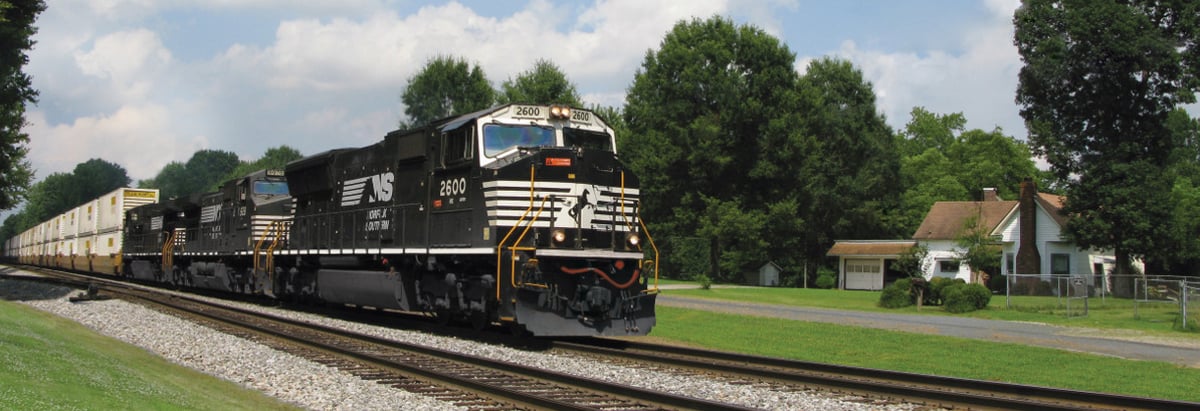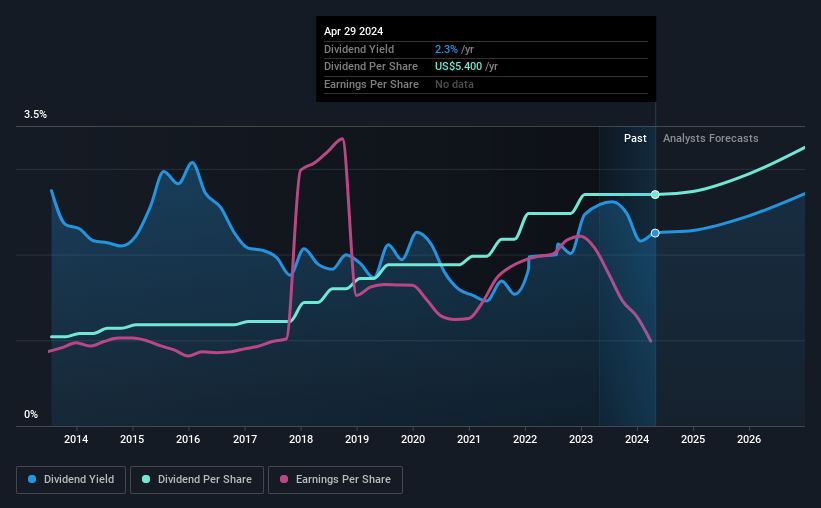
The board of Norfolk Southern Corporation (NYSE:NSC) has announced that it will pay a dividend on the 20th of May, with investors receiving $1.35 per share. This means the annual payment is 2.3% of the current stock price, which is above the average for the industry.
View our latest analysis for Norfolk Southern
Norfolk Southern's Dividend Is Well Covered By Earnings
While it is great to have a strong dividend yield, we should also consider whether the payment is sustainable. The last dividend made up quite a large portion of free cash flows, and this was made worse by the lack of free cash flows. We think that this practice can make the dividend quite risky in the future.
Over the next year, EPS is forecast to expand by 158.8%. Assuming the dividend continues along the course it has been charting recently, our estimates show the payout ratio being 37% which brings it into quite a comfortable range.

Norfolk Southern Has A Solid Track Record
Even over a long history of paying dividends, the company's distributions have been remarkably stable. Since 2014, the annual payment back then was $2.08, compared to the most recent full-year payment of $5.40. This implies that the company grew its distributions at a yearly rate of about 10% over that duration. So, dividends have been growing pretty quickly, and even more impressively, they haven't experienced any notable falls during this period.
Dividend Growth Is Doubtful
Some investors will be chomping at the bit to buy some of the company's stock based on its dividend history. Let's not jump to conclusions as things might not be as good as they appear on the surface. It's not great to see that Norfolk Southern's earnings per share has fallen at approximately 9.3% per year over the past five years. If earnings continue declining, the company may have to make the difficult choice of reducing the dividend or even stopping it completely - the opposite of dividend growth. It's not all bad news though, as the earnings are predicted to rise over the next 12 months - we would just be a bit cautious until this can turn into a longer term trend.
Norfolk Southern's Dividend Doesn't Look Sustainable
Overall, it's nice to see a consistent dividend payment, but we think that longer term, the current level of payment might be unsustainable. In the past the payments have been stable, but we think the company is paying out too much for this to continue for the long term. We would be a touch cautious of relying on this stock primarily for the dividend income.
Investors generally tend to favour companies with a consistent, stable dividend policy as opposed to those operating an irregular one. Meanwhile, despite the importance of dividend payments, they are not the only factors our readers should know when assessing a company. To that end, Norfolk Southern has 4 warning signs (and 1 which is a bit concerning) we think you should know about. If you are a dividend investor, you might also want to look at our curated list of high yield dividend stocks.
Valuation is complex, but we're here to simplify it.
Discover if Norfolk Southern might be undervalued or overvalued with our detailed analysis, featuring fair value estimates, potential risks, dividends, insider trades, and its financial condition.
Access Free AnalysisHave feedback on this article? Concerned about the content? Get in touch with us directly. Alternatively, email editorial-team (at) simplywallst.com.
This article by Simply Wall St is general in nature. We provide commentary based on historical data and analyst forecasts only using an unbiased methodology and our articles are not intended to be financial advice. It does not constitute a recommendation to buy or sell any stock, and does not take account of your objectives, or your financial situation. We aim to bring you long-term focused analysis driven by fundamental data. Note that our analysis may not factor in the latest price-sensitive company announcements or qualitative material. Simply Wall St has no position in any stocks mentioned.
About NYSE:NSC
Norfolk Southern
Engages in the rail transportation of raw materials, intermediate products, and finished goods in the United States.
Proven track record average dividend payer.
Similar Companies
Market Insights
Community Narratives




